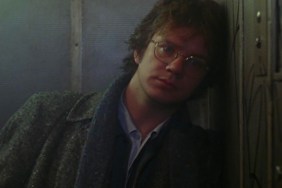
Philosopher Gottfried de Purucker called death the perfect sleep, while sleep is an imperfect fulfillment of death. Purucker writes that both sleep and death function similarly but one allows for a full and complete release, while the other only teases it. The deepest form of sleep is REM (rapid eye movement), which is when sleep becomes deep enough that you begin to dream. Ever since psychoanalyst Sigmund Freud popularized the notion of dreams bringing the unconsciousness into the consciousness of our dreams, dream interpretation has become its own industry, with books and websites specializing in it.
Films, especially genre films, continually explore the relationship between dreams and death. They can create nightmarish landscapes that easily oscillate between our world and another. Both Adrian Lynes Jacobs Ladder (1990) and Joel Schumachers Flatliners (1990) deal with characters who are crossing an unknown boundary between life and death, and the dreams that begin to follow them in their waking life. In both films, dreams ultimately allow the characters to confront what theyre hiding from, creating a kind of waking nightmare which forces them to take action in their own lives.
Flatliners continues the fine tradition of medical horror movies which center on doctors who get a little too carried away with playing God. Nelson Wright (Kiefer Sutherland) gathers his best and brightest medical school classmates for an extracurricular experiment: each takes a turn killing themselves for a short period of time while the others revive them. By doing so, theyre able to bring back their experiences from the afterlife and achieve the notoriety and fame they so desire. As the experiment proves successful, more of the group opts in. What they all learn too late is that whatever they see or experience in the afterlife comes from a past trauma or unresolved issue which, upon their return to the land of the living, proceeds to follow and torment them.
Director Joel Schumacher (Lost Boys, Batman Forever) never met a set he didnt like, which gives Flatliners a surrealist quality right off the bat. The cavernous sets seem to engulf the characters without their knowledge. Nelson, the de facto leader, is joined by Rachel (Julia Roberts) who isnt over the death of her Vietnam vet father; David (Kevin Bacon), the best and most reckless student in the joint; Joe (William Baldwin) the womanizer; and Randy (Oliver Platt), the worrier and only one in the group that doesnt undergo the experiment himself. After each of these characters is revived, they almost immediately begin to experience hallucinations. They start small, as one or two elements appear, and quickly escalate with each character confronted by a past trauma or memory which begins to take over their waking lives.
While the visions haunt and terrify the characters, they ultimately lead them to repair themselves and each other. The visions represent the repressed, and serve as a wakeup call to mend their pasts, in essence forcing themselves to live more truthfully and accept their sins. The longer youre in REM sleep the more elaborate and intense dreams generally become. If you begin REM sleep and one monster is chasing you, by the end of that dream it will be dozens. Its your bodys way of waking you up. In the case of Flatliners, when the young would-be doctors cross the boundaries of life and death, their minds issue the wakeup call of all wakeup calls, forcing them to confront their true nature and attempt to make amends for it.
In Adrian Lynes Jacobs Ladder, Jacob Singer (Tim Robbins) is a Vietnam vet living in New York. He deals not only with the trauma of war, but of losing a son from his first marriage. Haunted by demonic visions, hes unsure of who to trust and even what reality hes truly in. The title refers to a drug that the American government secretly tested on Jacobs unit, which might be the cause of his hallucinations. It also refers to the ladder that Jacob sees in the Old Testament which is supposed to lead one to heaven. In Jacobs present reality, hes a mailman living with his girlfriend Jezzie or Jezebel (Elizabeth Peña) who lashes out at him at every opportune moment, but also tries to keep him in that world with her. He also experiences vivid memories and flashbacks of the horrific scene with his unit in Vietnam. They believe they were attacked, but the memories become hazy and increasingly unreliable. Even Jacobs present in New York becomes deceptive as the demonic visions grow in frequency and number, creating some of the most nightmarish scenes in contemporary cinema.

Jacobs friend, confidant and chiropractor, Louis (Danny Aiello) tells him about the 14th century Christian mystic Meister Eckhart telling Jacob:
Eckhart saw Hell too. He said: The only thing that burns in Hell is the part of you that won’t let go of life, your memories, your attachments. They burn them all away. But they’re not punishing you, he said. They’re freeing your soul. So, if you’re frightened of dying and… you’re holding on, you’ll see devils tearing your life away. But if you’ve made your peace, then the devils are really angels, freeing you from the earth.
Jacob cannot forgive himself. He feels for the other men from his unit that survived and the ones that have died. He mourns the loss of his son and his estrangement from his family. He is deeply entrenched in his life, what he feels he owes to those around him and torturing himself for things he cannot change. He cannot let go.
Lyne directs the film in a way that feels very similar to dream, with different realities, memories and fears all merging together to the point where the audience feels they are being dragged down into Jacobs hellish present alongside him.

Jacobs Ladder confronts the emotions that force us to hang on, due to some kind of self-imposed servitude, and their terrifying implications. Jacobs co-mingling of the guilt and responsibility he feels over his son, family and his unit is what ties him to realities that are breaking and colliding in such a hallucinatory, disturbing way that they allow him to finally let go.
Both films mimic the patterns of a long form nightmare. From the deep sleep, in which menacing forces appear, to the final moment that ratchets up the intensity until your body forces you to wake. Where they differ: what happens when you truly wake up.
—
Alexandra West is a freelance horror journalist who lives, works, and survives in Toronto. Her work has appeared in the Toronto Star, Rue Morgue, Post City Magazine and Offscreen Film Journal. In December 2012, West co-founded the Faculty of Horror podcast with fellow writer Andrea Subissati, which explores the analytical side of horror films and the darkest recesses of academia.









